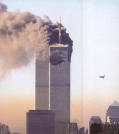|
 Mumbai: 11 September 2001 did change the world no buts about it. A simple example will prove that point. If this article were to be written before the event, it would have been titled Eleventh September and not September Eleven. It has even changed the way we speak. The changes in economies and businesses can, therefore, be imagined. Awesome. Mumbai: 11 September 2001 did change the world no buts about it. A simple example will prove that point. If this article were to be written before the event, it would have been titled Eleventh September and not September Eleven. It has even changed the way we speak. The changes in economies and businesses can, therefore, be imagined. Awesome.
The first business that comes to mind is the software industry. Based on the projections for 2002-03 of frontline software companies such as Infosys and Wipro, it looks like unhappy days are here to continue. Both the software majors, unveiling their earnings for the 2001-02 third quarter, indicated that 2002-03 will be uncertain. Lack of clarity in business prospects remains a key issue. They may have put 9/11 (there I go again) behind them, but the recession in the US is a dampener.  The main problem facing the Indian software industry is the drop in technology spending in the US, the main destination for Indian software exports it accounts for nearly 60 per cent of its revenues. The first-ever contraction in US technology spending by 1.1 per cent in 2001 was probably the biggest setback faced by Indian software companies. Since then, leading technology research outfits such as Gartner and the Yankee group have projected a modest growth in IT spending in 2002. The main problem facing the Indian software industry is the drop in technology spending in the US, the main destination for Indian software exports it accounts for nearly 60 per cent of its revenues. The first-ever contraction in US technology spending by 1.1 per cent in 2001 was probably the biggest setback faced by Indian software companies. Since then, leading technology research outfits such as Gartner and the Yankee group have projected a modest growth in IT spending in 2002.
The aviation sector is struggling to stay afloat and the problems will continue for the players in the international aviation industry, which has suffered an estimated loss of over $15 billion during 2001, according to experts. The airlines, which have survived the 9/11 events, are dealing with a situation of skyrocketing insurance premiums, increased security costs and ebbing passenger confidence.  In response to the 9/11 events and the downturn in the global economy, IATA has firmed up priorities for 2002 with a focus on enhancing and harmonising security to passengers, ensuring that the government role in third-party war risk is fully defined and reinforcing the need for governments and third-party service providers to temporarily freeze or reduce rate levels, given the reduced traffic. In response to the 9/11 events and the downturn in the global economy, IATA has firmed up priorities for 2002 with a focus on enhancing and harmonising security to passengers, ensuring that the government role in third-party war risk is fully defined and reinforcing the need for governments and third-party service providers to temporarily freeze or reduce rate levels, given the reduced traffic.
Since 9/11, a series of events have taken their toll on the hotel industry. Hotels are in no position to increase room rates, as there is no demand push to hike prices. Even more disturbing could be the further lowering of room rates to maintain current occupancy levels. With the maintaining of occupancy rates taking priority, price pressure is expected as hotels try and woo customers. With overcapacities prevailing in destinations, the supply side pressures could also seriously affect pricing.  More international chains are actively pursuing the Indian market. Increasing competition has not helped improve the prevailing situation. To some extent, these factors have affected the earnings performance of leading companies in fiscal 2002. Neither are prospects in the immediate future too bright. More international chains are actively pursuing the Indian market. Increasing competition has not helped improve the prevailing situation. To some extent, these factors have affected the earnings performance of leading companies in fiscal 2002. Neither are prospects in the immediate future too bright.
The 9/11 terrorist attacks affected the travel plans of most Western travellers. The subsequent war in Afghanistan, followed by rising tensions along the India-Pakistan border, made matters worse. With tensions yet to ease the perception of a greater security threat remains. In this context, recovery is unlikely this fiscal. Indo-Pak tensions and the risk of a nuclear fallout also provoked some governments to issue travel advisories, and many foreign businesses in India have either quit or cut down their involvement with Indian business. The war clouds also cut a huge hole in Indias defence spending. Crores of rupees were spent on keeping the forces on alert and although the threat may have subsided, it has not been fully eliminated. This means more-than-normal defence spending.  Insurance industries worldwide took a beating and the loss on account of the collapse of the twin towers itself ran into billions of dollars. Insurance premia on aviation and sea cargo have skyrocketed, thus affecting the price of goods. Insurance industries worldwide took a beating and the loss on account of the collapse of the twin towers itself ran into billions of dollars. Insurance premia on aviation and sea cargo have skyrocketed, thus affecting the price of goods.
The Indian farmer and the Indian manufacturing industry are reeling under the effects of a less-than-normal monsoon. The less-than-normal rainfall is being attributed to the war in Afghanistan by some scientists. The American fighter planes are supposed to have emitted noxious gases into the atmosphere, which has affected the monsoons. All this only on account of what happened within one hour on one black September day. One dreads to think what would happen if Osama bin Laden, reportedly hiding somewhere in Pakistan, were to engineer another strike.
|